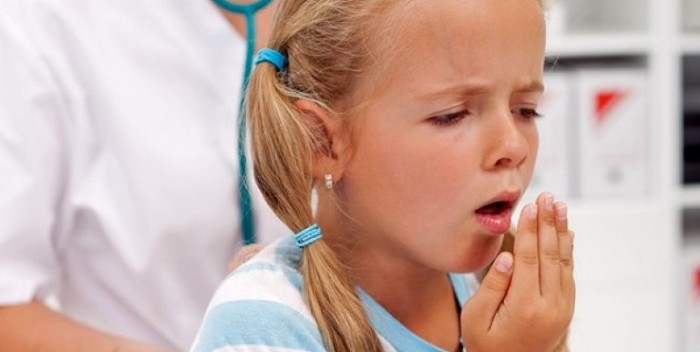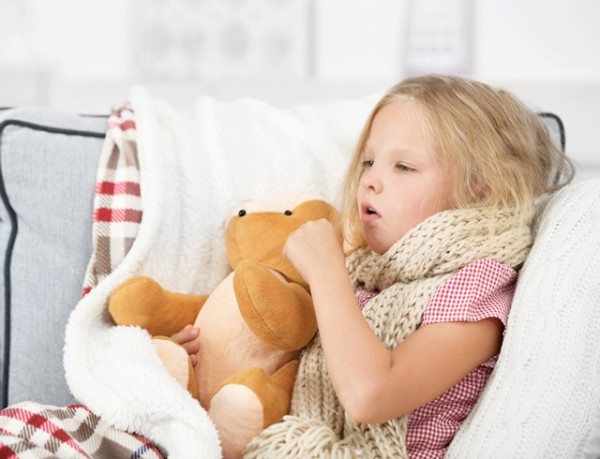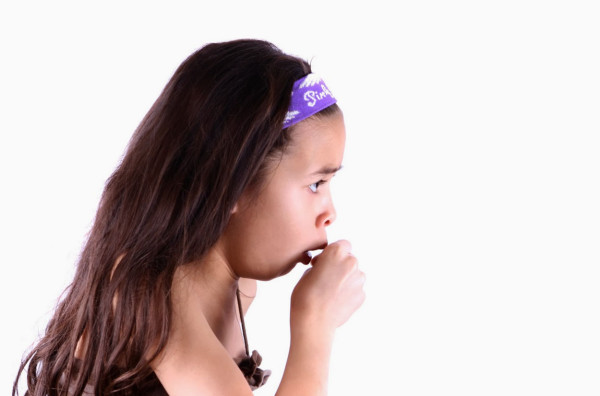Dry cough in a child: causes and treatment
Cough is a very common clinical symptom that accompanies various diseases. A dry cough causes a lot of anxiety for the baby - it causes uncomfortable and painful sensations and does not allow him to fully rest at night.
Content
Causes of dry cough in children
At its core, a cough is the body's response to protect the respiratory tract from foreign agents. There are sensitive receptors on the mucous membrane that react to any foreign particles, microorganisms and even dry air. The brain receives signals from receptors and immediately sends an impulse to the respiratory muscles to contract. This is a cough. The cough is dry due to the fact that the amount of secretion is insufficient, or because of its high viscosity.
Children often suffer from various diseases of the respiratory system, they account for more than half of all childhood ailments. In babies, a dry cough develops several times more often than a wet one, most often it is provoked by the following pathologies:
- bronchopulmonary dysplasia and other congenital pathologies;
- respiratory and colds;
- diseases of the nasopharynx, in which there is a looseness of the mucous membrane of the pharyngeal region;
- the presence of a foreign body in the respiratory tract, which could have entered during feeding or for other reasons;
- increased production of saliva, which is observed in a child during teething or when the baby is crying;
- various infectious diseases;
- overstrain as a result of frequent stress;
- the impact on the child's body of allergens;
- diseases of the respiratory system, for example, asthma;
- cardiac pathology.
Often the causes of a dry cough in a baby can be parasites, which, during their movement through the body, injure the lung tissue.
Parents should be aware that in the presence of a foreign body in the baby's larynx, coughing can be accompanied by suffocation, and often a foreign object can descend into the bronchi. At the same time, he provokes an inflammatory process there, accompanied by a purulent discharge. If you have such symptoms, you should urgently consult a doctor.
Prolonged dry cough in a child
Long dry cough indicates that the body has inflammation or irritation of the upper respiratory tract. In this case, the temperature can be either elevated or normal.
Sometimes a child can cough for a long time after a cold or after an inflammatory process in the bronchopulmonary system. This is called a residual cough. It does not need to be treated, after a couple of weeks it goes away on its own.
A prolonged dry cough can also occur for other reasons, which can be determined by the color of the secreted sputum and by the nature of the cough.
- A hacking dry cough accompanied by a red throat is most likely a respiratory condition.
- Prolonged, not frequent, but constant coughing can be a sign of a dangerous disease - tuberculosis.
- A cough, which manifests itself in the form of asthma attacks, occurs with bronchial asthma.
- Allergic cough is very similar to tuberculosis, however, it is not always dry, if the allergy is severe enough, then the cough is usually wet.
- An infrequent and dry cough may indicate the presence of helminthic invasions in the body. This cough may disappear for a couple of weeks and then resume.
- When the larynx is irritated, the strength and frequency of the cough depends on how strong the stimulus is. Barking dry cough develops with spasm of the larynx under the influence of dry or cold air. This cough usually goes away after the child drinks warm tea. But if the conditions do not change, then after a while the cough comes back again.
- A cough can occur with some diseases of the gastrointestinal tract, for example, when the contents of the stomach are thrown into the esophagus. This phenomenon can be observed after eating or when the child takes a horizontal position.
A lingering dry cough can occur for a variety of reasons, the most common of them were presented above, we must not forget that a cough is only a symptom, so it is not the cough itself that needs to be treated, but the reasons that cause it.
Night dry cough
A dry cough that bothers a child at night may have the reasons described earlier, in order to relieve a child of a nocturnal paroxysmal cough, the following should be done:
- Place a pillow over the child's back so that the upper body is raised or seated. In this way, the mucus will drain better and the breathing will be easier.
- Give warm water or tea to drink. Moisturizing will relieve a dry cough, and when wet, it will wash away mucus that makes breathing difficult.
- You can give the child milk with honey - this remedy will envelop the irritated mucous membranes and quickly stop the attack.
- If a dry cough is provoked by dry air, then you can either open a window, or spray water around the baby's bed, or turn on a humidifier.
- In case of an allergic cough, it is necessary to eliminate the allergen, if an attack occurs at night, carefully examine the room, remove the bedspread with nap, soft toys, household chemicals, perfumes, and so on. You can also give your child an antihistamine.
- With an attack of bronchial asthma, steam inhalation with eucalyptus, coltsfoot, any conifers and thyme will help.
- To warm up and expand the bronchi, you can rub the child with camphor oil, however, rubbing is contraindicated at a rubbing temperature.
It is important not to panic when a child coughs at night, but to clearly and confidently perform the proposed manipulations, the parents' anxiety will be passed on to the baby and the cough may intensify.
Dry cough without fever
It is very important to find out the causes of dry cough and start treatment, otherwise the pulmonary and bronchial secretions will remain in the airways and cause serious complications. A dry cough (even without a rise in temperature) can lead to the fact that the child develops oxygen starvation, because the bronchi will no longer perform their functions in full. The longer this condition continues, the more severe the consequences of hypoxia will develop.
Often a dry cough in the absence of an elevated temperature indicates that the inflammatory process has not been completely cured, and, therefore, if appropriate measures are not taken, the cough will turn into a chronic form. It is extremely difficult and long to fight a chronic cough. In addition, chronic cough can cause the development of asthmatic syndrome or provoke obstructive bronchitis.
A dry cough irritates the mucous membrane of the larynx and pharynx, which leads to its looseness and more active susceptibility to attacks of pathogenic agents. Consequently, the risk of developing infectious diseases increases.
How to treat a dry cough in a child
To dry cough treatment the child had the right one, it should be prescribed by the attending physician, based on the reasons that provoke this symptom.
For infectious diseases, antibiotics and antiviral drugs are prescribed. Children are most often prescribed antiviral suppositories - Viferon or Genferon Light, in addition, Arbidol has an immunomodulatory and antiviral effect.
As for antibacterial drugs, they cannot be prescribed to a child on their own. In addition, when taking antibiotics, it is necessary to give the child prebiotics to ensure the prevention of dysbiosis. Bifidumbacteri, Linex, Befiform and others are considered effective.
Symptomatic drugs are also shown:
- Antitussives - they block receptors and affect the cough center. For example, Sinekod.
- Mucolytics - liquefy phlegm and provoke its separation and excretion from the bronchi - ACC, Lazolvan, Bromhexin.
- Expectorants - increase the amount of mucus and improve its discharge - Mukaltin, Pertussin and so on.
Only a doctor can combine these drugs, since the wrong combination of medications can worsen the child's condition. 
In addition to suppositories, tablets and sprays, inhalations are prescribed for coughing. The main task of such therapy is to ensure the maximum intake of drugs in the respiratory tract. The dosage and the drug are prescribed by a specialist, but Berodual or Erispal are most often used - they relieve inflammation well and facilitate the passage of sputum. It is very important to remember that inhalation at a temperature is dangerous!
With an allergic cough, antihistamines are prescribed, and with bronchial asthma, drugs that contribute to the expansion of the bronchi. Drug therapy for coughing in children should be very careful and correct, since the running processes are much more difficult to treat.
Alternative treatment of dry cough in children
Traditional medicine offers a large number of remedies for the treatment of dry cough, before using them, it is imperative to consult a doctor, especially for children prone to allergic reactions. This is due to the fact that most of the folk recipes are based on the use of medicinal plants and bee products. A child may develop an allergic reaction to both.
When coughing, children are often prescribed a chest collection, which includes various plants that have anti-inflammatory and expectorant effects. They can be used for gargling or inhalation. If the child is very small, then you can use essential oils, for example, coniferous. It can be dripped into an aroma lamp or simply into a bowl of hot water.
The most popular expectorant is licorice. The pharmacy version of licorice syrup contains alcohol and a lot of sugar, so it is better to prepare the infusion yourself. To do this, pour boiling water over the roots of the plant, boil for 5 minutes, and then leave to infuse for an hour or two. You need to use this tool within 7 days, longer use of licorice negatively affects the water-electrolyte balance.
It is recommended that the child be given ginger with honey. This remedy not only has an expectorant effect, but also understands immunity well.
Antimicrobial agent is radish with honey. In the radish, you need to cut a depression into which the honey is placed. The radish itself should be placed in a bowl, since after a few hours juice will be released from it, which will collect in the container. You need to drink the juice in a tablespoon several times a day.
Before going to bed, the child is advised to give milk with honey, milk with butter, or bananas mashed in milk. If the baby does not tolerate milk, then it can be replaced with herbal anti-inflammatory tea.
Compresses are recommended. The most popular of these is a compress based on vegetable oil, alcohol and honey. All ingredients must be taken in equal quantities, mixed well and applied to cheesecloth. The gauze is placed on the baby's chest and covered with cling film on top. You can not leave such a compress at night, one hour is enough for warming up.
A dry cough relieves a compress with apple cider vinegar, but before applying it, you need to lubricate the child's skin with vegetable oil to prevent irritation. It is a good idea to rub the chest area with badger or bear fat. Such procedures are advised for very lingering coughs and tuberculosis.
When treating dry cough, it is very important to monitor the humidity in the room, it should be at least 60%, and it is also recommended to maintain an optimal temperature regime of + 22 ° C. Warmer air, as well as colder air, will negatively affect the condition of the respiratory tract.






